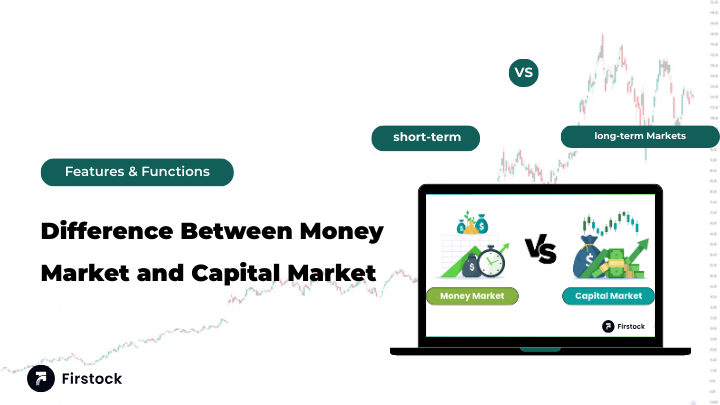Difference Between Money Market and Capital Market | 2026

Difference Between Money Market and Capital Market: Simple Guide for Everyone
Understanding financial terms can feel confusing, especially when words like money market and capital market show up everywhere—from news headlines to investment apps. But here’s the truth: these concepts are far simpler than they sound.
Think of the financial world as a city with two important stations:
- One is a short-stop station, where people quickly borrow or lend money for a few days or months.
- The other is a long-journey station, where people invest for years to build wealth.
These two stations represent the money market and the capital market.
In this article, you’ll learn the difference between money market and capital market in the simplest way possible, using everyday examples and friendly language.We’ll also understand what is money market, what is capital market, and how platforms like Firstock make accessing the capital market easier for everyday investors.
Let’s begin!
Introduction to Financial Markets
Financial markets are like large marketplaces where money is exchanged, invested, saved, and borrowed. But just like you wouldn’t buy groceries from a furniture shop, different financial needs require different markets.
- Need money for a short time? → You use the money market
- Want to invest for wealth? → You use the capital market
Both markets help the economy run smoothly, but each one serves a unique purpose.
What Is Money Market?
The money market is a market for short-term borrowing and lending, typically for a period of one day to one year.
It’s designed to keep the financial system stable by maintaining liquidity (the flow of cash). Only large institutions participate directly, but everyday people benefit from it through products like liquid mutual funds.
In simple words:👉 The money market acts like a temporary cash locker for banks and companies.
Key Features of Money Market
Here are the characteristics that define the money market:
- Short-term duration (less than 1 year)
- High liquidity (can be converted to cash quickly)
- Low risk due to short tenure
- Wholesale nature
- Supports working capital needs
Main Money Market Instruments
Treasury Bills (T-Bills)
Short-term government securities — extremely low-risk.
Commercial Papers (CP)
Companies use these to borrow money for short-term needs.
Certificates of Deposit (CDs)
Issued by banks offering fixed interest for a short period.
Repos (Repurchase Agreements)
Short-term loans backed by securities.
Call Money
Overnight loans between banks.
Who Uses the Money Market?
- Banks
- Reserve Bank / Central Bank
- Large corporations
- Financial institutions
- Mutual fund houses
- NBFCs
Retail investors participate indirectly through short-term funds or liquid instruments.
What Is Capital Market?
The capital market is where long-term investments happen — anything with a maturity of more than one year.
It includes:
- Stocks
- Bonds
- Mutual funds
- Debentures
- Long-term debt instruments
If the money market is a temporary cash stop, the capital market is like a garden where your money has time to grow and multiply.
Key Features of Capital Market
- Long-term financing
- Higher return potential
- Higher risk compared to money markets
- Open to all investors
- Supports economic growth
Major Capital Market Instruments
Equity Shares
Ownership in companies.
Bonds and Debentures
Long-term debt instruments issued by companies or governments.
Mutual Funds
Professionally managed investments.
Derivatives
Instruments like futures and options.
Preference Shares
Shares with fixed dividend benefits.
Primary vs Secondary Capital Market
Primary Market
Where companies raise money for the first time (like IPOs).
Secondary Market
Where investors trade existing securities — this is the regular stock market you see on apps like Firstock, NSE or BSE.
Participants in Capital Markets
- Retail investors
- Foreign investors
- Stockbrokers
- Banks
- Insurance companies
- Financial institutions
- Governments
Difference Between Money Market and Capital Market
Here’s the simplest comparison:
If you want quick, safe parking for money → money market. If you want long-term growth → capital market.
Why These Markets Matter to You
You may not directly participate in the money market, but it still affects your:
- Loan interest rates
- Savings rates
- Inflation
- Economic conditions
The capital market matters because it helps you:
- Build wealth
- Diversify your investments
- Beat inflation
- Achieve long-term goals
Easy Real-Life Examples
Money Market Example
A company needs ₹5 crore for only 15 days to pay suppliers. Instead of taking a long-term loan, it issues commercial paper. This is the money market at work.
Capital Market Example
A startup wants to expand nationwide. They raise ₹200 crore by selling shares through an IPO. This is the capital market.
How Firstock Makes Capital Market Investing Simple
When it comes to participating in the capital market, ease of use matters. This is where Firstock stands out — naturally and without hype.
Firstock offers:
- Simple, clean trading platform
- Easy stock investing for beginners
- Low brokerage & smooth experience
- Smart tools to track your long-term investments
- Educational insights for informed decision-making
Whether you’re investing in equities, long-term funds, or planning your wealth journey, Firstock - option trading app provides a reliable, beginner-friendly environment to get started.
This makes accessing the capital market — especially for new investors — far easier and more confidence-driven.
Conclusion
Both markets are essential to our financial system, but they serve different purposes:
- Money Market = short-term, low risk, high liquidity
- Capital Market = long-term, higher returns, wealth building
Once you understand these concepts, making smart financial decisions becomes much easier. And if you want a smooth, simple way to participate in the capital market, trading apps like Firstock make the experience accessible and beginner-friendly.
FAQs
1. What is money market used for?
It is used for short-term borrowing and lending to maintain liquidity in the financial system.
2. What is capital market and why is it important?
It’s a market for long-term investments like stocks and bonds. It helps individuals grow wealth and companies raise funds.
3. Which market is safer: money market or capital market?
The money market is safer because it deals with short-term, low-risk instruments.
4. Can beginners invest in the capital market?
Yes! Anyone can invest through stockbrokers like Firstock, which offer user-friendly platforms.
5. What is the main difference between money market and capital market?
The money market handles short-term funds, while the capital market handles long-term investments and wealth creation.





